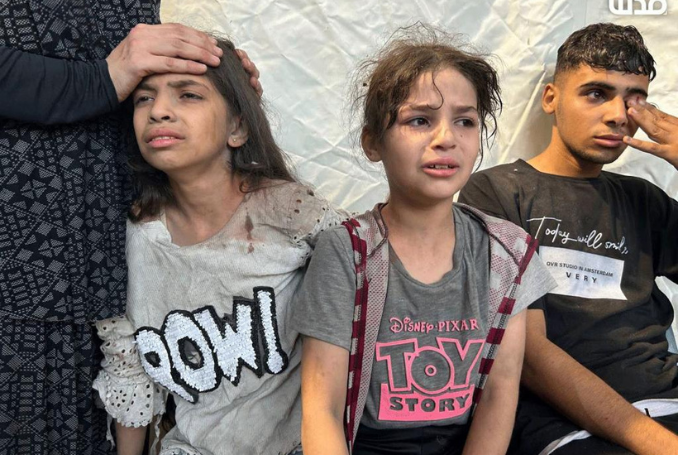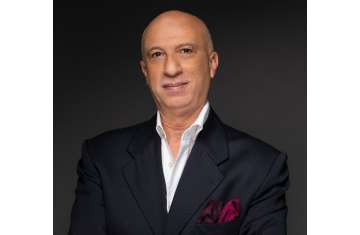The poem ‘Write My Name’ by Zeina Azzam is a brief reflection on the plight of Palestinian people in Palestine
Write my name….
Write my name on my leg mama…
Use the black permanent marker, with the ink that doesn’t bleed if it gets wet, the one that doesn’t melt if it’s exposed to heat…
Write my name on my leg mama…
Make the lines thick and clear…
Add your special flourishes, so I can take comfort in seeing my mama’s handwriting when I go to sleep…
Write my name on my leg mama…
And on the legs of my sisters and brothers…
This way we will belong together…
This way we will be known as your children…
Write my name on my leg mama…
And please write your name and Baba’s name on your legs too so we shall be remembered as a family…
Write my name on my leg mama…
When the bomb hits our house when the walls crush our skulls and bones…
Our legs will tell our story, how there was nowhere for us to run.”
(Zeina Azzam)
The War has always been understood as a place of exception where normalcy is abandoned. Israel- Palestine War is one of the most brutal wars in the history of human life. As I write this many Women and Children are dying. The viral video depicts one of the instances where a Palestinian woman read a poem “Write My Name” written by Zeina Azzam, a Palestinian-American poet. The poem has contextualized itself in the ongoing Israel-Palestine War. In this poem, she narrates about a boy who is asking her mother to write her name on his leg. The poem depicts the situation of Parents in Gaza where some of them resorted to writing their Children’s names on their legs to help identify them in case either they or their children are killed.
The poem starts with the boy requesting his Mother to write his name on his leg with a permanent marker so that it does not disappear even if it gets soaked in blood or exposed to the fire of a bomb. The boy further narrates to his mom and requests her to make it thick and clear and add her flourishes so that when he dies at least he is close to her and feels the comfort in this painful death. The poem moves further with the boy asking her Mother to write the name of her sister too so that when he or she dies at least their names engraved in his body will give a sense of belonging together. And he says (in a poem) this way we will be identified as family and we will be considered as your children. The poem ends with very powerful lines, “When the bomb hits our house, when the walls crush our skulls, both our legs will tell our story. There was nowhere for us to run. Through these two very powerful lines, the poet reflects on the current condition where bombs are pounding their houses but they have no place to seek shelter. It depicts the painful migration of Gazan people from one side to the other but there were no places where bombs were not pounding the city. Even though they were denied asylum in neighboring countries despite knowing the situation they were trapped and had nowhere to run. Gaza is an open-air camp.
The poem starts with the boy requesting his Mother to write his name on his leg with a permanent marker so that it does not disappear even if it gets soaked in blood or exposed to the fire of a bomb.
This poem is very meaningful and appealing in depicting the debilitating life of the Palestinian people who are living in constant fear of devastation and death. Major casualties in this war were women and children and the poem aptly narrates this reality. It depicts the plight of a boy and his mother despite being civilians (non-participants in War) they are getting killed. This war has snatched not just their belongings to the motherland where they are born but also snatching the basic human right to have family and live and die with them. Under this devastation, the boy is requesting her mother to write his name on his leg and the leg of her sister and request her to add her and father’s names too. So that when he dies at least through the names written on his body he will belong and die together. Writing names on children’s bodies shows the level of horror people are going through there. And this poem paints the ongoing misery of the Palestinian people.
To make a more nuanced understanding of the situation we can use the conceptual framework of the famous Italian Philosopher Agamben. His writing on Camp is well-known and established in academia. As we have previously discussed Gaza is an open-air camp. Agamben draws his ideas from classical Greek philosophers (like Aristotle) to make his arguments. He discussed two kinds of life categorized in the classical Greek world, Zoe and Bios. Zoe is understood as living common to all living beings (Animals, Humans, or Gods) while Bios is a form or manner of living peculiar to a single individual or group. Further, it is important to mention his conceptualization of Form-of-life a life in which it is never possible to isolate something such as naked life. He defines Naked Life as a life kept safe and protected only to the degree to which it submits itself to the Sovereign’s right of life and death.

To reflect on the situation of Gaza from these conceptual points is very interesting and unravelling. The life which Gazans are living is Zoe, merely a way of life where living is concerned with being alive. They don’t have ‘possibilities of life’ mere existence is the necessary and the only choice. He calls such life a “Bare” or “Naked life”. The life where the biological aspect is given priority over the quality and potentialities of life. And at any moment any of them could be killed with impunity. Their life is subject to the sovereign Israel who determines the value of their life whether they are worthy of being alive or not. To make it more sense, Israel determines whether an Individual in Gaza is a terrorist (Hamas) or not and therefore worthy of living. Israel draws its legitimacy from the fact that it is doing an act of good for Humanity, ‘annihilating the life unworthy of living’. In Israel’s logic, Terrorists (Hamas) are unworthy of living and their annihilation is good for not just Israel but for the world as well. So the situation in Palestine qualifies as an explicit expression of the modern form of Biopolitics.
Published under Internatioal Cooperation with" Sindh Courier"

Comments